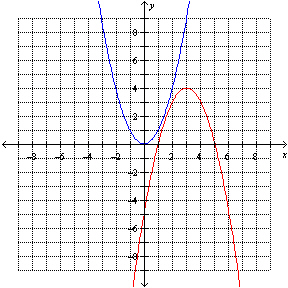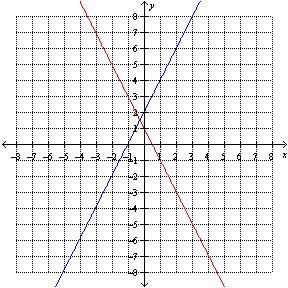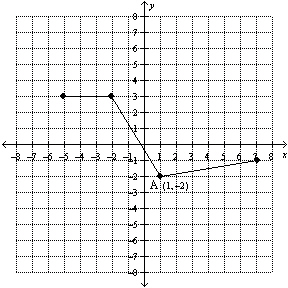Multiple Choice
Identify the
choice that best completes the statement or answers the question.
|
|
|
1.
|
In the following graph, which transformations must be applied to the blue curve
to obtain the red curve?  A | a reflection in the x-axis, a vertical translation of 4 units up, and a
horizontal translation of 3 units to the right | B | a reflection in the x-axis, a vertical
translation of 3 units up, and a horizontal translation of 4 units to the right | C | a reflection in the
x-axis, a vertical translation of 3 units down, and a horizontal translation of 4 units to the
right | D | a reflection in the x-axis, a vertical translation of 4 units up, and a
horizontal translation of 3 units to the left |
|
|
|
2.
|
In the graph shown, which transformations must be applied to the blue curve to
obtain the red curve?  A | a reflection in the y-axis and a translation of 3 units up | B | a reflection in the
y-axis and a translation of 3 units down | C | a reflection in the x-axis and a
translation of 3 units up | D | a reflection in the x-axis and a
translation of 3 units down |
|
|
|
3.
|
Which of the following functions is the correct inverse for the function  ,
{ x | x ³ 0, x Î R}?
|
|
|
4.
|
Which of the following relations is the correct inverse for the function  ?
|
|
|
5.
|
Compared to the graph of the base function  , the graph of the
function  is translated A | 10 units to the right | C | 10 units down | B | 10 units to the left | D | 10 units up |
|
|
|
6.
|
Compared to the graph of the base function  , the graph of the
function  is translated A | 4 units up | C | 4 units down | B | 4 units to the right | D | 4 units to the
left |
|
|
|
7.
|
Given the graph of f( x) shown below, what are the coordinates of
point A if the transformed graph is represented by  ? 
|
|
|
8.
|
The function  represents a transformation that can best be described as
A | a reflection in the x-axis and the y-axis | C | a reflection in the
y-axis | B | a reflection in the line y = x | D | a reflection in the
x-axis |
|
|
|
9.
|
When a function is reflected in the y-axis, the coordinates of point
(x, y) become
A | (x, –y) | C | (–x, y) | B | (x, y) | D | (–x,
–y) |
|
|
|
10.
|
When a > 0, the function  has what relationship to the base
function  ? A | f(x) is stretched horizontally by a factor of 1/|a| and reflected in
the y-axis | B | f(x) is stretched vertically by a factor of |a| | C | f(x) is
stretched vertically by a factor of |a| and reflected in the x-axis | D | f(x) is
stretched horizontally by a factor of 1/|a| |
|
Short Answer
|
|
|
1.
|
Determine the equation, in standard form, of each parabola after being
transformed from  by the given translations. a) 4 units to the
right and 3 units up b) 2 units to the left and 1 unit up c) 2 units down and 7
units to the left
|
|
|
2.
|
a) Determine the inverse graph of the function f(x) =
3x + 2 in two ways:
i) Determine 5 points on the line, switch their
x-coordinates and y-coordinates, and graph the new set of points, connecting these new
points with a straight line.
ii) Algebraically determine the inverse of the function and
graph this function.
b) How do your answers in part a) compare?
|
Problem
|
|
|
1.
|
Two skydivers jump out of a plane. The first skydiver’s motion can be
modelled by the function  . The second skydiver jumps 10 s later with a goal of
catching up to the first skydiver. The motion of the second skydiver can be modelled by  .
For both functions, the height is measured in metres and the time is the number of seconds after the
second skydiver jumps. a) Graph the functions on the same set of axes. b) Will
the second skydiver catch up to the first before they have to open their parachutes at 800
m? c) State the domain and range of these functions in this context.
|
|
|
2.
|
In ballistics, the paths of projectiles are studied. It is known that the
greater the speed at which an object is fired, the farther it will travel. For a particular
spring-loaded cannon, this relationship can be modelled by  , where d is the distance, in
metres, travelled by the projectile and v is the muzzle speed, in metres per
second. a) Graph the distance function and state its domain and range. b) Graph
the inverse of the distance function. What does it represent? State its domain and range.
|
|
|
3.
|
Given the function  , a) determine the inverse of the
function b) graph the function and its inverse on the same set of axes
|